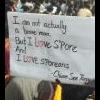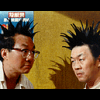Search the Community
Showing results for tags 'Interview'.
-
Very interesting interview series. Must take a lot of courage for all of them to be willing to do this. Next one is President Tharman apparently
-
Dunno if posted before as the thread was hundred of pages long...
-
https://www.channelnewsasia.com/commentary/workplace-discrimination-age-jobs-recruitment-3900191 14 jobs and 5 industry changes later - marketing and editorial professional Imran Johri found himself facing ageism in the job market. SINGAPORE: “The team is quite young and we intend to nurture a hustle culture with them.” This, I would soon realise - in hiring terms - was code for, "I don’t think you’ll fit in, old man". That in itself didn’t bother me much, but what did bother me though, was that I was beginning to see a trend. In the most recent batch of about six job interviews I’d attended, there began to emerge an archetype of hiring managers that, within minutes of talking to me, would in high probability reject my candidacy. At first, my thought was “Am I the problem here?”. After much self-reflection I can wholeheartedly say, maybe. Before you judge my annoying prata-flips, let me give some context. GOING AGAINST THE GRAIN Ageism in the workplace has been under the spotlight recently, with a survey released by the Ministry of Manpower in July showing that age was the most common form of discrimination experienced by jobseekers. Across age groups, those aged 40 and over had a much higher incidence of being discriminated against. Considering that Singapore’s retirement age is 63 - and is set to be raised to 65 in 2030 - being told that you’re too old for a job while in your 40s is unnervingly early. Singapore’s population is not only ageing, but ageing rapidly - with 25 per cent of Singaporeans expected to be 65 and older by 2030. This will be a massive change not only for society, but the workplace too. Luckily for older workhorses like me, the Tripartite Guidelines on Fair Employment Practices will soon be enshrined into law. Now, anyone who’s ever seen my resume will either brand me an incorrigible job-hopper or commend me for my extensive and varied work experience. To be fair, both of these cursory judgments are valid. Right out of university, I was fuelled by abject idealism, and despite growing older and wiser, this intrinsic motivation or rebellious passion to go against the grain has fuelled most of my career choices. This of course came at a cost - for I knew this was not the path to wealth, fame or meteoric success, but rather, a self-gratifying journey of personal wins. Despite this - never would I imagine that after 24 years of chasing that next new exciting project - I would come to a head-on collision with ageism. FROM YOUNG UPSTART TO OLD BIRD The first five years of work were often peppered with, “let’s do this, you’re clearly hungry” from my first bosses. And I absolutely was, my risk appetite was bottomless and I wanted to do more, all the time. I went from being scriptwriter for an award-winning TV show to being the editor of two men’s magazines. I was on a career warpath, and I worked myself very close to burn-out. Luckily for me, I eventually recalibrated, mostly from stints overseas and really started to pace myself, but by then the publishing industry was starting to decline. I then had to make the hard decision to switch industries and at that point, it was plausible and easier, in fact, to change, mostly because my next batch of bosses in marketing saw my editorial experience as a huge plus. By 2018, I had become the head of marketing for a venture capital (VC) but alas, I had also come to a point where I had to make another tough choice. I had to either become an entrepreneur, as per the philosophy of the VC, or choose an alternate pathway, which the organisation would fully endorse and support either way. So after five years with the VC, I chose to leave and to explore what the market held for a 49-year old man with a chequered CV. YOUNG GUN MARKETEERS ARE A DIME A DOZEN The rejections were varied and in volume, some of them coming in fast and furious. “You don’t have the necessary experience,” was a common reply. So was “We’re looking for someone less senior”. In retrospect, it’s hilarious to me now how I simultaneously didn’t have the necessary experience and yet be too senior for the job. Some rejections, however, were slow and painful, with multiple interviews across recruiters, managers and directors. To which I was either ghosted or simply sent a very tardy rejection email. One thing stood out for me though, during those tough job-search months - I became adept at identifying the specific type of hiring manager that would reject me after the first meeting. They were always early- to mid-30s marketeers, who’d attained an accelerated upward trajectory in the marketing world and were now the marketing heads. Now, I can absolutely empathise with their decision to reject me outright. Those hiring managers were under pressure to lead young, high-performance teams, all of whom were hungry and ready to hustle. The last thing they needed was an older man to second-guess their decisions in the midst of the fire-fighting and chaos. They needed to move ahead, unabated. But here’s the thing about being an older guy with experience, I will second-guess and challenge the decision-making process if I think there might be a better way of doing things. UNCLE CAN’T HOLD HIS TONGUE So am I the problem here? Maybe. Is ageism being practised? I think so. But not in an absolutist way. In fact, I would argue that it’s nuanced and contextual. In the end, just as I eventually knew what would not work in my favour - I started seeing what would. Some of the interviews I’ve attended were an absolute joy, with clear, transparent communication and hiring managers who saw the value I brought to the table. I have since made the transition to a technology company, one that has one of the most diverse team compositions I have ever worked with, with everyone driven to ensure we make a mark in the market. One of the annoying key drivers of ageism, it seems, is the belief that older employees can't keep up with technological advancements. Preposterous. I’m literally a tech-bro at 49 - and the assumption that older employees lack the vigour, adaptability or skills required for a “young person” role is unfounded. We older guys have too much at stake, with too many dependents and no time, to even consider ourselves being at a "disadvantage". So if you’re on the job hunt, keep at it. No matter who you are, or what you do, there will be an -ism working against you. But take heed, take notes and take charge of your own career - it’s the only way to go. Imran Johri is a marketing and editorial professional with extensive experience in the Asia Pacific region.
-
Hey there guys, So not a performance review this time ( next week will be another one though) but I did my first one on one interview with a known but very unpopular brand in South Africa ... Mahindra. I went to find out more about their range and history of the brand. a few very interesting facts came out that I didn't even know about. Was a fun one to do. https://youtu.be/lMwPzT_K0Dk Please let me know what you think.
-
- 46 replies
-
- 13
-

-
Lee Kuan Yew’s Two Younger Children File Case on Interview Deal http://www.bloomberg.com/news/articles/2015-09-22/lee-kuan-yew-s-two-younger-children-file-case-on-interview-deal Lee Kuan Yew’s two younger children initiated court action in Singapore relating to an agreement between their late father, the city’s first prime minister, and the government. Lee Wei Ling and Lee Hsien Yang, executors of the elder Lee’s estate, filed a court application on Sept. 2, according to a record with the Singapore High Court. Their father’s agreement related to the "custody and use" of interviews given by the former premier to the government’s Oral History Department, according to a statement by the Attorney-General, the respondent. “The government will establish the proper interpretation and status of the agreement before the court,” it said in the statement. Further details of the case weren’t immediately available, and Lee Hsien Yang declined to comment. Lee Wei Ling wasn’t immediately available to comment. The Republic of Singapore’s founding father, Lee Kuan Yew, died on March 23 at the age of 91, triggering a nationwide outpouring of grief. More than a million people waited for as long as 10 hours to pay their last respects. Lee’s death and celebrations to mark Singapore’s 50th year of independence helped the ruling People’s Action Party, helmed by eldest son Prime Minister Lee Hsien Loong, extend its more than five-decade rule at the Sept. 11 election. The case is Lee Wei Ling, Lee Hsien Yang v Attorney-General, OS816/2015. Singapore High Court. Anyone heard anything about this ???
- 70 replies
-
- 3
-

-
- lee kuan yew
- lky
- (and 6 more)
-
I recall when I first entered the workforce, I told the interviewer it's my passion to work in this industry. He said 'passion can 当饭吃?' I ended the interview with some nasty words for the director. No prizes if I got the job or not
-
Hi bros... I just got a call to go for an interview for Asst Electricity Trader... but I don't really know anything much about the job... Hope any of you guys here got experience can give me some advice? Thanks in advance!
-
Not sure if this is true or not.... some of the questions are really http://www.impactinterview.com/2009/10/140-google-interview-questions/ Google Interview Questions: Product Marketing Manager •Why do you want to join Google? •What do you know about Google’s product and technology? •If you are Product Manager for Google’s Adwords, how do you plan to market this? •What would you say during an AdWords or AdSense product seminar? •Who are Google’s competitors, and how does Google compete with them? •Have you ever used Google’s products? Gmail? •What’s a creative way of marketing Google’s brand name and product? •If you are the product marketing manager for Google’s Gmail product, how do you plan to market it so as to achieve 100 million customers in 6 months? •How much money you think Google makes daily from Gmail ads? •Name a piece of technology you’ve read about recently. Now tell me your own creative execution for an ad for that product. •Say an advertiser makes $0.10 every time someone clicks on their ad. Only 20% of people who visit the site click on their ad. How many people need to visit the site for the advertiser to make $20? •Estimate the number of students who are college seniors, attend four-year schools, and graduate with a job in the United States every year. Google Interview Questions: Product Manager •How would you boost the GMail subscription base? •What is the most efficient way to sort a million integers? •How would you re-position Google’s offerings to counteract competitive threats from Microsoft? •How many golf balls can fit in a school bus? •You are shrunk to the height of a nickel and your mass is proportionally reduced so as to maintain your original density. You are then thrown into an empty glass blender. The blades will start moving in 60 seconds. What do you do? •How much should you charge to wash all the windows in Seattle? •How would you find out if a machine’s stack grows up or down in memory? •Explain a database in three sentences to your eight-year-old nephew. •How many times a day does a clock’s hands overlap? •You have to get from point A to point B. You don’t know if you can get there. What would you do? •Imagine you have a closet full of shirts. It’s very hard to find a shirt. So what can you do to organize your shirts for easy retrieval? •Every man in a village of 100 married couples has cheated on his wife. Every wife in the village instantly knows when a man other than her husband has cheated, but does not know when her own husband has. The village has a law that does not allow for adultery. Any wife who can prove that her husband is unfaithful must kill him that very day. The women of the village would never disobey this law. One day, the queen of the village visits and announces that at least one husband has been unfaithful. What happens? •In a country in which people only want boys, every family continues to have children until they have a boy. If they have a girl, they have another child. If they have a boy, they stop. What is the proportion of boys to girls in the country? •If the probability of observing a car in 30 minutes on a highway is 0.95, what is the probability of observing a car in 10 minutes (assuming constant default probability)? •If you look at a clock and the time is 3:15, what is the angle between the hour and the minute hands? (The answer to this is not zero!) •Four people need to cross a rickety rope bridge to get back to their camp at night. Unfortunately, they only have one flashlight and it only has enough light left for seventeen minutes. The bridge is too dangerous to cross without a flashlight, and it’s only strong enough to support two people at any given time. Each of the campers walks at a different speed. One can cross the bridge in 1 minute, another in 2 minutes, the third in 5 minutes, and the slow poke takes 10 minutes to cross. How do the campers make it across in 17 minutes? •You are at a party with a friend and 10 people are present including you and the friend. your friend makes you a wager that for every person you find that has the same birthday as you, you get $1; for every person he finds that does not have the same birthday as you, he gets $2. would you accept the wager? •How many piano tuners are there in the entire world? •You have eight balls all of the same size. 7 of them weigh the same, and one of them weighs slightly more. How can you find the ball that is heavier by using a balance and only two weighings? •You have five pirates, ranked from 5 to 1 in descending order. The top pirate has the right to propose how 100 gold coins should be divided among them. But the others get to vote on his plan, and if fewer than half agree with him, he gets killed. How should he allocate the gold in order to maximize his share but live to enjoy it? (Hint: One pirate ends up with 98 percent of the gold.) •You are given 2 eggs. You have access to a 100-story building. Eggs can be very hard or very fragile means it may break if dropped from the first floor or may not even break if dropped from 100th floor. Both eggs are identical. You need to figure out the highest floor of a 100-story building an egg can be dropped without breaking. The question is how many drops you need to make. You are allowed to break 2 eggs in the process. •Describe a technical problem you had and how you solved it. •How would you design a simple search engine? •Design an evacuation plan for San Francisco. •There’s a latency problem in South Africa. Diagnose it. •What are three long term challenges facing Google? •Name three non-Google websites that you visit often and like. What do you like about the user interface and design? Choose one of the three sites and comment on what new feature or project you would work on. How would you design it? •If there is only one elevator in the building, how would you change the design? How about if there are only two elevators in the building? •How many vacuum’s are made per year in USA? Google Interview Questions: Software Engineer •Why are manhole covers round? •What is the difference between a mutex and a semaphore? Which one would you use to protect access to an increment operation? •A man pushed his car to a hotel and lost his fortune. What happened? •Explain the significance of “dead beef”. •Write a C program which measures the the speed of a context switch on a UNIX/Linux system. •Given a function which produces a random integer in the range 1 to 5, write a function which produces a random integer in the range 1 to 7. •Describe the algorithm for a depth-first graph traversal. •Design a class library for writing card games. •You need to check that your friend, Bob, has your correct phone number, but you cannot ask him directly. You must write a the question on a card which and give it to Eve who will take the card to Bob and return the answer to you. What must you write on the card, besides the question, to ensure Bob can encode the message so that Eve cannot read your phone number? •How are cookies passed in the HTTP protocol? •Design the SQL database tables for a car rental database. •Write a regular expression which matches a email address. •Write a function f(a, b) which takes two character string arguments and returns a string containing only the characters found in both strings in the order of a. Write a version which is order N-squared and one which is order N. •You are given a the source to a application which is crashing when run. After running it 10 times in a debugger, you find it never crashes in the same place. The application is single threaded, and uses only the C standard library. What programming errors could be causing this crash? How would you test each one? •Explain how congestion control works in the TCP protocol. •In Java, what is the difference between final, finally, and finalize? •What is multithreaded programming? What is a deadlock? •Write a function (with helper functions if needed) called to Excel that takes an excel column value (A,B,C,D…AA,AB,AC,… AAA..) and returns a corresponding integer value (A=1,B=2,… AA=26..). •You have a stream of infinite queries (ie: real time Google search queries that people are entering). Describe how you would go about finding a good estimate of 1000 samples from this never ending set of data and then write code for it. •Tree search algorithms. Write BFS and DFS code, explain run time and space requirements. Modify the code to handle trees with weighted edges and loops with BFS and DFS, make the code print out path to goal state. •You are given a list of numbers. When you reach the end of the list you will come back to the beginning of the list (a circular list). Write the most efficient algorithm to find the minimum # in this list. Find any given # in the list. The numbers in the list are always increasing but you don’t know where the circular list begins, ie: 38, 40, 55, 89, 6, 13, 20, 23, 36. •Describe the data structure that is used to manage memory. (stack) •What’s the difference between local and global variables? •If you have 1 million integers, how would you sort them efficiently? (modify a specific sorting algorithm to solve this) •In Java, what is the difference between static, final, and const. (if you don’t know Java they will ask something similar for C or C++). •Talk about your class projects or work projects (pick something easy)… then describe how you could make them more efficient (in terms of algorithms). •Suppose you have an NxN matrix of positive and negative integers. Write some code that finds the sub-matrix with the maximum sum of its elements. •Write some code to reverse a string. •Implement division (without using the divide operator, obviously). •Write some code to find all permutations of the letters in a particular string. •What method would you use to look up a word in a dictionary? •Imagine you have a closet full of shirts. It’s very hard to find a shirt. So what can you do to organize your shirts for easy retrieval? •You have eight balls all of the same size. 7 of them weigh the same, and one of them weighs slightly more. How can you fine the ball that is heavier by using a balance and only two weighings? •What is the C-language command for opening a connection with a foreign host over the internet? •Design and describe a system/application that will most efficiently produce a report of the top 1 million Google search requests. These are the particulars: 1) You are given 12 servers to work with. They are all dual-processor machines with 4Gb of RAM, 4x400GB hard drives and networked together.(Basically, nothing more than high-end PC’s) 2) The log data has already been cleaned for you. It consists of 100 Billion log lines, broken down into 12 320 GB files of 40-byte search terms per line. 3) You can use only custom written applications or available free open-source software. •There is an array A[N] of N numbers. You have to compose an array Output[N] such that Output will be equal to multiplication of all the elements of A[N] except A. For example Output[0] will be multiplication of A[1] to A[N-1] and Output[1] will be multiplication of A[0] and from A[2] to A[N-1]. Solve it without division operator and in O(n). •There is a linked list of numbers of length N. N is very large and you don’t know N. You have to write a function that will return k random numbers from the list. Numbers should be completely random. Hint: 1. Use random function rand() (returns a number between 0 and 1) and irand() (return either 0 or 1) 2. It should be done in O(n). •Find or determine non existence of a number in a sorted list of N numbers where the numbers range over M, M>> N and N large enough to span multiple disks. Algorithm to beat O(log n) bonus points for constant time algorithm. •You are given a game of Tic Tac Toe. You have to write a function in which you pass the whole game and name of a player. The function will return whether the player has won the game or not. First you to decide which data structure you will use for the game. You need to tell the algorithm first and then need to write the code. Note: Some position may be blank in the game। So your data structure should consider this condition also. •You are given an array [a1 To an] and we have to construct another array [b1 To bn] where bi = a1*a2*…*an/ai. you are allowed to use only constant space and the time complexity is O(n). No divisions are allowed. •How do you put a Binary Search Tree in an array in a efficient manner. Hint :: If the node is stored at the ith position and its children are at 2i and 2i+1(I mean level order wise)Its not the most efficient way. •How do you find out the fifth maximum element in an Binary Search Tree in efficient manner. Note: You should not use use any extra space. i.e sorting Binary Search Tree and storing the results in an array and listing out the fifth element. •Given a Data Structure having first n integers and next n chars. A = i1 i2 i3 … iN c1 c2 c3 … cN.Write an in-place algorithm to rearrange the elements of the array ass A = i1 c1 i2 c2 … in cn •Given two sequences of items, find the items whose absolute number increases or decreases the most when comparing one sequence with the other by reading the sequence only once. •Given That One of the strings is very very long , and the other one could be of various sizes. Windowing will result in O(N+M) solution but could it be better? May be NlogM or even better? •How many lines can be drawn in a 2D plane such that they are equidistant from 3 non-collinear points? •Let’s say you have to construct Google maps from scratch and guide a person standing on Gateway of India (Mumbai) to India Gate(Delhi). How do you do the same? •Given that you have one string of length N and M small strings of length L. How do you efficiently find the occurrence of each small string in the larger one? •Given a binary tree, programmatically you need to prove it is a binary search tree. •You are given a small sorted list of numbers, and a very very long sorted list of numbers – so long that it had to be put on a disk in different blocks. How would you find those short list numbers in the bigger one? •Suppose you have given N companies, and we want to eventually merge them into one big company. How many ways are theres to merge? •Given a file of 4 billion 32-bit integers, how to find one that appears at least twice? •Write a program for displaying the ten most frequent words in a file such that your program should be efficient in all complexity measures. •Design a stack. We want to push, pop, and also, retrieve the minimum element in constant time. •Given a set of coin denominators, find the minimum number of coins to give a certain amount of change. •Given an array, i) find the longest continuous increasing subsequence. ii) find the longest increasing subsequence. •Suppose we have N companies, and we want to eventually merge them into one big company. How many ways are there to merge? •Write a function to find the middle node of a single link list. •Given two binary trees, write a compare function to check if they are equal or not. Being equal means that they have the same value and same structure. •Implement put/get methods of a fixed size cache with LRU replacement algorithm. •You are given with three sorted arrays ( in ascending order), you are required to find a triplet ( one element from each array) such that distance is minimum. •Distance is defined like this : If a, b[j] and c[k] are three elements then distance=max(abs(a-b[j]),abs(a-c[k]),abs(b[j]-c[k]))” Please give a solution in O(n) time complexity •How does C++ deal with constructors and deconstructors of a class and its child class? •Write a function that flips the bits inside a byte (either in C++ or Java). Write an algorithm that take a list of n words, and an integer m, and retrieves the mth most frequent word in that list. •What’s 2 to the power of 64? •Given that you have one string of length N and M small strings of length L. How do you efficiently find the occurrence of each small string in the larger one? •How do you find out the fifth maximum element in an Binary Search Tree in efficient manner. •Suppose we have N companies, and we want to eventually merge them into one big company. How many ways are there to merge? •There is linked list of millions of node and you do not know the length of it. Write a function which will return a random number from the list. •You need to check that your friend, Bob, has your correct phone number, but you cannot ask him directly. You must write a the question on a card which and give it to Eve who will take the card to Bob and return the answer to you. What must you write on the card, besides the question, to ensure Bob can encode the message so that Eve cannot read your phone number? •How long it would take to sort 1 trillion numbers? Come up with a good estimate. •Order the functions in order of their asymptotic performance: 1) 2^n 2) n^100 3) n! 4) n^n •There are some data represented by(x,y,z). Now we want to find the Kth least data. We say (x1, y1, z1) > (x2, y2, z2) when value(x1, y1, z1) > value(x2, y2, z2) where value(x,y,z) = (2^x)*(3^y)*(5^z). Now we can not get it by calculating value(x,y,z) or through other indirect calculations as lg(value(x,y,z)). How to solve it? •How many degrees are there in the angle between the hour and minute hands of a clock when the time is a quarter past three? •Given an array whose elements are sorted, return the index of a the first occurrence of a specific integer. Do this in sub-linear time. I.e. do not just go through each element searching for that element. •Given two linked lists, return the intersection of the two lists: i.e. return a list containing only the elements that occur in both of the input lists. •What’s the difference between a hashtable and a hashmap? •If a person dials a sequence of numbers on the telephone, what possible words/strings can be formed from the letters associated with those numbers? •How would you reverse the image on an n by n matrix where each pixel is represented by a bit? •Create a fast cached storage mechanism that, given a limitation on the amount of cache memory, will ensure that only the least recently used items are discarded when the cache memory is reached when inserting a new item. It supports 2 functions: String get(T t) and void put(String k, T t). •Create a cost model that allows Google to make purchasing decisions on to compare the cost of purchasing more RAM memory for their servers vs. buying more disk space. •Design an algorithm to play a game of Frogger and then code the solution. The object of the game is to direct a frog to avoid cars while crossing a busy road. You may represent a road lane via an array. Generalize the solution for an N-lane road. •What sort would you use if you had a large data set on disk and a small amount of ram to work with? •What sort would you use if you required tight max time bounds and wanted highly regular performance. •How would you store 1 million phone numbers? •Design a 2D dungeon crawling game. It must allow for various items in the maze – walls, objects, and computer-controlled characters. (The focus was on the class structures, and how to optimize the experience for the user as s/he travels through the dungeon.) •What is the size of the C structure below on a 32-bit system? On a 64-bit? Google Interview: Software Engineer in Test •Efficiently implement 3 stacks in a single array. •Given an array of integers which is circularly sorted, how do you find a given integer. •Write a program to find depth of binary search tree without using recursion. •Find the maximum rectangle (in terms of area) under a histogram in linear time. •Most phones now have full keyboards. Before there there three letters mapped to a number button. Describe how you would go about implementing spelling and word suggestions as people type. •Describe recursive mergesort and its runtime. Write an iterative version in C++/Java/Python. •How would you determine if someone has won a game of tic-tac-toe on a board of any size? •Given an array of numbers, replace each number with the product of all the numbers in the array except the number itself *without* using division. •Create a cache with fast look up that only stores the N most recently accessed items. •How to design a search engine? If each document contains a set of keywords, and is associated with a numeric attribute, how to build indices? •Given two files that has list of words (one per line), write a program to show the intersection. •What kind of data structure would you use to index annagrams of words? e.g. if there exists the word “top” in the database, the query for “pot” should list that. Google Interview: Quantitative Compensation Analyst •What is the yearly standard deviation of a stock given the monthly standard deviation? •How many resumes does Google receive each year for software engineering? •Anywhere in the world, where would you open up a new Google office and how would you figure out compensation for all the employees at this new office? •What is the probability of breaking a stick into 3 pieces and forming a triangle? Google Interview: Engineering Manager •You’re the captain of a pirate ship, and your crew gets to vote on how the gold is divided up. If fewer than half of the pirates agree with you, you die. How do you recommend apportioning the gold in such a way that you get a good share of the booty, but still survive? Google Interview: AdWords Associate •How would you work with an advertiser who was not seeing the benefits of the AdWords relationship due to poor conversions? •How would you deal with an angry or frustrated advertisers on the phone?
-
On CNA now interview this dr park. Erp is cheap.
-
Hi, I had made an OD claim against my own insurer. The loss adjuster and surveyor had contacted me and ask me for an interview. Anyone have similar experience? May i know what kind of questions do they ask?
-
hi guys. anyone working in civil service/statboard? can share some ideas on the working enviroment/culture? as well as the interview process/ commonly asked questions? thanks!
-
Do read this article if you have the time. He is much better and more qualified than most MPs yet humble. Harvard, Oxford and Stanford. http://www.straitstimes.com/vgn-ext-templa...0000a35010aRCRD
-
Something to read about the man who refuse to give up fighting. http://sg.news.yahoo.com/blogs/singaporesc...-050517946.html
-
非你莫属 is a TV show on job interview. (ok, i admit it is not really a very popular show but the recent episode is interesting to have a glimpse on the society, be it culture, value, priority...) The following video is about a lady contestant (studied and stayed in NZ for a total of 6 years and went back to China) and host (张绍刚) http://v.ku6.com/show/IeRx8NwWkyHb2jSkxAUf8Q...html http://dzh.mop.com/whbm/20120117/0/Sz7777I28a72c1Fz.shtml The following video is a follow up comment in another programme. http://v.youku.com/v_show/id_XMzQyNjEwNzg0.html There are many discussions on this contestant. http://club.china.com/data/thread/1011/2736/39/06/7_1.html
- 2 replies
-
- contestant
- mainland
-
(and 3 more)
Tagged with:
-
Hey everyone found a very interesting interview of the owner and brain behind the Koenigsegg brand. This is a very interesting video where you discover where the idea to create this supercar brand was born. High quality video and sound. Hope you all enjoy
-
- Christian
- Koenigsegg
-
(and 1 more)
Tagged with:
-
this is what tony tan has say http://www.youtube.com/watch?v=BkBlcxt50as...feature=related the reaction of the crowd to tony tan on nomination day http://www.youtube.com/watch?v=mFo9OzROkmA..._embedded#at=18
-
Is it a norm? Lazy to wear one..
-
very enlightening. He explain there is a place for civil disobedience. in fact Ong Teng Cheong sanction strikes for worker in shipyard before
- 4 replies
-
- Interesting
- interview
-
(and 2 more)
Tagged with:
-
Abstract from Nicole FB NSP lodged 3 complaint against TPL for breach of Cooling Day . Election Department can ignore 1 queries.. but it cannot ignore 1million queries. please do your part and call 1800 818 0088| Email: [email protected] to SEEK OFFICIAL RESPONSE ON THIS MATTER http://theonlinecitizen.com/2011/05/toc-br...cebook-posting/
-
FORMER PRESIDENT ONG TENG CHEONG's INTERVIEW - INSIGHT INTO PROBLEMS BETWEEN HIM AND THE PAP!!! .....MOST REVEALING! President Ong's interview with Asiaweek - revisited Wednesday, 18 February 2009, 12:12 pm - In light of President Nathan's press conference where he explained why he approved the government's request to use the reserves, we re-publish former President Ong Teng Cheong's interview with AsiaWeek (10 March 2000) where he revealed the obstacles he faced when he asked for the copies of the government's accounts on the reserves and investments. 'I Had a Job to Do' Whether the government liked it or not, says ex-president Ong ONG Teng Cheong will go down in history as Singapore 's first elected president. But for twenty years before that, the Chinese-educated, foreign-trained architect was a stalwart of the nation's People's Action Party government led by its first PM Lee Kuan Yew. Ong, now 64, was minister of communications, of culture, and of labor; he was also deputy PM, secretary-general of the National Trades Union Congress, and chairman of Lee's PAP. By common consent, he was the man who kept the Chinese ground loyal to the party; indeed, his command of the language was such that Lee always asked Ong to accompany him whenever he visited China . In the 1980s, Ong was one of the party's four senior 'second echelon' leaders who were considered as possible successors to Lee. It was Ong's longtime friend, Goh Chok Tong, who got the nod for the job. Ong, who was diagnosed as suffering from lymphatic cancer in 1992, chose instead to run in the first elections for the presidency the following year. He won - and soon became embroiled in a six-year long festering dispute with his former colleagues in government over how much information he should have in order to fulfil his role in safeguarding Singapore's prodigious financial reserves. The altercation came to a head last year when Ong and his mentor Lee and friend Goh clashed publicly and rancorously in a rare display of disunity among PAP heavyweights. He decided not to run for re-election as president - but not ! before he had spooked Goh's men by leaving the announcement until the last moment. He has now returned to the private architecture firm he set up with his late wife, Ling Siew May, and which is now run by one of his two sons. His doctors have given him a clean bill of health after a debilitating bout with lymphatic cancer - though he still wears a cap to cover the baldness caused by chemotherapy treatment. Last week, he gave his first in-depth interview about his presidency to senior correspondent Roger Mitton in a nearly two-hour long talk. Extended Excerpts: It's now six months since you stepped down. How do you feel about your time as president? I am satisfied with what I did. I hope it was all for the best. I was elected to do a job. And I had to do that job whether the government - or anyone else - liked it or not. It seems that often they did not like it, but let's go back: How did you first get into politics? In the early 1970s, Lee Kuan Yew asked me for an interview to get me involved to stand for election. I stood in 1972 and I won and became a PAP backbencher. A year later, Lee asked me to take up ministerial office but I turned it down because my younger brother was dying of cancer. I had to assist him and to settle his affairs after he died at the age of 25. Then Lee Kuan Yew approached me again and this time I agreed to take up office. Lee is very persuasive. He must have been impressed to make you a minister so quickly - you were a young architect with no experience of politics. Yes, I was not trained to become a minister or a politician, but you learn on the job. Whenever I went to a new ministry, I always asked myself basic questions: What is this job all about? What am I supposed to do? That's what I did in 1980, for instance, when I became minister of labor, in addition to being minister for communications. I went through all the legislation and I decided that the trade unions should not just be designed to organize and finance strikes, but instead shou! ld help improve the workers' social and economic wellbeing. You became head of the NTUC and also remained a cabinet minister - and Singapore remained strike free. Yes. But in January 1986 I did sanction a strike, the first for about a decade. It was in the shipping industry where the management was taking advantage of the workers. I did not even tell the cabinet about santioning the strike. And some of them were angry with me about that. The minister for trade and industry was very angry, his officers were very upset. They had calls from America , asking what happened to Singapore ? - we are non-strike. I said: if I were to inform the cabinet or the government they would probably stop me from going ahead with the strike. It only lasted two days. Then all the issues were settled. It showed that management was just trying to pull a fast one. So I believe what I did was right. It marked a trend - that you have never been afraid of doing something your ministerial colleagues might disagree with? No. If they don't like it, I can always come back here to my architecture firm. Around this time you were discussing the succession to PM Lee? Lee Kuan Yew had been discussing this since about 1983. At that time, the second echelon was Tony Tan, S. Dhanabalan, Goh Chok Tong and myself. Were you a candidate for the top job? I was considered as a member of the group. At that time, we did not know who would be the successor to Lee. We finally made the decision to pick Goh Chok Tong. He agreed on condition that I agreed to be his number two. So I was the second DPM; he was the first DPM. In 1988, Lee asked Goh to take over, but he was not ready. He said: two more years. So two years later, he took the job. Lee did not agree with your decision to pick Goh. No, he did not disagree. He said he would leave it to us. His own first choice was Tony Tan. Goh Chok Tong was his second choice. I was his third choice because he said my English was not good enough. He said D! hanabalan was not right because Singapore was not ready for an Indian prime minister. That upset the Indian community. There was quite a bit of adverse reaction to what he said. But he speaks his mind. He is the only one who can get away with it. Personally, you felt Goh was the right man? Well, among the four of us, he was the youngest. Tony Tan said no. I said no. And he sort of accepted being pushed into the position, on condition that we stay on to assist him. Soon after taking over, Goh called a snap election in 1991 - but the PAP's vote slipped and there was talk he would quit. Well, we did discuss about that. But he didn't indicate that he wanted to step down. At that time, you were no. 2 in the executive after PM Goh. Yes. Well, no. 2, no. 3, doesn't matter. So why run for president? The elected presidency was Lee Kuan Yew's initiative. He came out with the idea way back in '82, '83. After parliament passed the measure in 1991, I considered it seriously. At that time, after 20 years in politics, I was thinking of a way to ease myself out, to exit the political arena. I wrote to the prime minister twice to say that I'm prepared to go. You saw the presidency as a way to do that? Yes, the unionists egged me on. They came to see me a couple of times and they suggested that I take it on. I discussed it with the prime minister, being old friends, and he gave me his support. The well-known oppositionist J.B. Jeyaretnam wanted to run against you? Yes, but he was not allowed to because he did not qualify under the stringent criteria. Maybe too stringent. You were glad Jeyaretnam could not run? No, it's okay. I think it would have been more fun. Some of your colleagues did not think it was much fun when your only opponent, a former accountant-general, Chua Kim Yeoh, got so much support? Yes, all of them were quite worried. Some ministers even called me to say: Oh, we are worried about the outcome! . At first, we were quite confident about getting over 70 percent of the vote. But there was a swing of support over to my opponent's side, especially in the educated class - civil servants and the Shenton Way group. The issue was whether they wanted a PAP man as president to check on a PAP government, or whether it would be better to have a neutral independent like Chua. That's why they voted against me because I had the PAP government support. I would have been happier without the PAP's open support. I think I would have been better off with just the unionists' support and the Chinese-educated heartlanders. Without them I would not have been elected. But you did win and you had to figure out how to do this new job as Singapore 's first elected president. Yes. At the first opening of parliament after I was elected, I was given a speech prepared by the government. I read the speech carefully. Besides ceremonial functions, it said that I'm supposed to safeguard the reserves and to help society become more compassionate and gracious. So I decided that, well, if that is what is said in the speech, then that's going to be my job. And I am going to do it. That's what I tried to do. In fact, during the six years I was president, I was very busy. Doing what? Well, I got involved in a lot of things. The Istana presidential palace and other places had to be renovated. All this had to be planned and these places got ready one by one, so that ceremonial functions and other business could go on as usual. I had to press the government to finalize the procedures for the protection of the reserves. A lot of the teething problems and misunderstandings were because there was a lack of clearcut procedures of what to do. Towards the end of my term, I pressed the prime minister for a White Paper to be tabled in parliament that would set out all the principles and procedures for the elected president. Then I will announce my decision to step down. I want to get the job done. Initially, he did not wan! t to do that? It's not that he did not want to do that, but it had been dragging for a long time. They produced a White Paper eventually, tabled it in parliament last July, and that made the future president's job easier. We have already tested out many of the procedures during my term, except for asking the president to approve a draw on the past reserves during a deep economic crisis. That was never done. It's that part of procedure that was not tested. How to do it? It was this issue that caused the dispute between you and the government? Yes. But I don't want to go into details and upset everybody. The thing is that the elected president is supposed to protect the reserves, but he was not told what these are until five years later. From the day the Constitution was amended in 1991 to provide for an elected president, he was supposed to fulfil that role. My predecessor, Wee Kim Wee, although he was not elected, was supposed to play that role during the last two years of his term. But he did not actively check. So, when I came in in 1993, I asked for all this information about the reserves. It took them three years to give it to me. The holdup was for administrative reasons? Either that or they did not think there was any urgency. You see, if you ask me to protect the reserves, then you've got to tell me what I'm supposed to protect. So I had to ask. Why did they not want to tell you? I do not know. Don't ask me, because I don't have the answer. I've been asking them. In fact, in 1996, exactly halfway through my term, I wrote prime minister Goh a letter. At that time, everybody was expecting a general election in December or January. After the election, a new government would be sworn in. When that happens, all the reserves, whether past or current, become past reserves and are locked up on the changeover date. As president, I have to safeguard them and they can only be drawn upon with my permission. So I said to Mr Goh: It's already halfway through my term, but! until today I still don't know all these figures about the reserves. So the government had been stonewalling you, the president, for three years? Yes. What happened actually was, as you know, in accounting, when you talk about reserves, it's either cash reserves or assets reserves. The cash side is straightforward: investment, how many million dollars here and there, how much comes from the investment boards and so on. That was straightforward - but still we had to ask for it. For the assets, like properties and so on, normally you say it's worth $30 million or $100 million or whatever. But they said it would take 56-man years to produce a dollar-and-cents value of the immovable assets. So I discussed this with the accountant-general and the auditor-general and we came to a compromise. The government would not need to give me the dollar-and-cents value, just give me a listing of all the properties that the government owns. They agreed? Well, yes, they agreed, but they said there's not the time for it. It took them a few months to produce the list. But even when they gave me the list, it was not complete. It seems the Singapore government does not know its own assets? Yes. It's complicated. It's never been done before. And for the assets of land, I can understand why. Every piece of land, even a stretch of road, is probablysubdivided into many lots. There are 50,000 to 60,000 lots and every one has a number. If you want to value them all, it would take a long time. In the past, they have just locked everything up and assumed it is all there. But if I am to protect it, at least I want to know the list. When they eventually gave you the list - the incomplete list, did you have enough staff to do the checking and other work? No, I did not. I only had one administrative staffer and two part-timers from the auditor-general's office. For things like approving the budget of statutory boards, the auditor-general's office would normally go through that for me. They ! are very good. They check on everything. And they query and ask for information. For government financial policy matters that you had a veto over, did you get all the details? They finally came with an executive summary to say that they had checked through all this, and that this is what they have, this is how much they are going to spend, and that it won't need any draw from the reserves - or that there's likely to be a draw. There never was a draw during my time, but there were instances where it was a bit dicey whether the budgets of one or two statutory boards would require a draw. But finally we resolved that. Eventually then, with the list of properties and the executive summaries, you were kept informed? I wouldn't be able to say that. Even in my last year as president, I was still not being informed about some ministerial procedures. For example, in April last year, the government said it would allow the sale of the Post Office Savings Bank POSB to DBS Bank. In the past, when there was no elected president, they could just proceed with this kind of thing. But when there is an elected president you cannot, because the POSB is a statutory board whose reserves are to be protected by the president. You cannot just announce this without informing him. But I came to know of it from the newspaper. That is not quite right. Not only that, but they were even going to submit a bill to parliament for this sale and to dissolve the POSB without first informing me. What did you do? My office went to tell them that this was the wrong procedure. You've got to do this first, do that first, before you can do this. It was question of principle and procedure. We had to bring all this to their attention. That they cannot forget us. It's not that we are busybodies, but under the Constitution we have a role to play and a responsibility. Sometimes in the newspaper I came to know of things that I am responsible for, but if it had not been reported in the newspaper I would not know about i! t. You must have been pretty angry that this was still happening in your last year as president? Yes, I was a bit grumpy. And maybe not to the liking of the civil service. They did not like what I said. But I have to be a watchdog all the time, you see. So this is where they are supposed to help me to protect the reserves. And not for me to go and watch out when they do right or wrong. Under the Constitution, you have the right to all the information available to the cabinet. Yes. That's right. And I sourced much information from the cabinet papers. But they are not used to it. So I said: I understand, it's something new, and I know you don't like my interference and busybody checking up and so on. But under the Constitution it is my job to do that. Despite all this, it was widely believed that you wanted to run again for a second six-year term as president? No, I'd been telling my friends since late 1998 that my inclination was not to stand for re-election. But of course, life is unpredictable. In March last year, I went to Stanford and my American doctor confirmed that my cancer was in complete remission. He is very experienced, a world authority on my sickness. So I was fine after my treatment. I gave a complete report to the prime minister and we discussed it. I told him that my inclination was not to stand, but that I'd make the announcement later on. Then the cabinet met and they decided that if I were to stand again, they would not support me. You had been given a clean bill of health, yet your former colleagues would not support you. Did that annoy you? I told the prime minister over lunch: Well, I don't need your cabinet support. If I want to stand, whether I do or not, it will be my personal decision. And I'll make that decision nearer the date of the presidential election - because I have another checkup in June, July, and I want to know my latest position. Also my wife was sick with cancer and we knew that if she died, it would be difficult for ! me to stand without a first lady. She felt very apologetic and that was another reason why my inclination was not to stand. I hoped that if I stepped down I would have more time to be with my wife, because her prognosis was not very good. By waiting until July to announce your decision, were you ruffling the government for the way they had treated you? Maybe so. Maybe it was my miscalculation that my stated inclination not to stand again had not been good enough for them. But I had been telling that to all my friends. And I did not want to tell people my wife was dying, either. But the government worried that you might suddenly decide to run again. No, I made it very clear and I called a press conference in July to tell everybody. But I believe some people were still afraid that I might turn up on nomination day. Even friends asked me if I might do that. How could they? I had given my word that I would not stand. A straw poll apparently indicated you would beat the government's candidate, S.R. Nathan, if you had stood. Yes. But I gave my word that I would not run. And I don't think it's right. I'm a very old-fashioned man. Also, my wife passed away in September. And I became more sceptical about all these medical reports. Well, not sceptical, but certainly I find life more unpredictable than I thought. Full of uncertainties. In the end you were happy to stand down? Yes, I'd been preparing for that psychologically since late 1998. I was quite happy when the decision was made, happy to return to private life to do the work that I enjoy. How are your relations with PM Goh these days? They are okay. I just had lunch with him last week. I can't invite him now, so he invited me. When I was president, we took turns to invite each other for lunch in the Istana. Did Senior Minister Lee join you? No, we did that separately. Lee spoke out against you last year. How are your relations with him now? We've never quarrelled. It's said that your recalcitrance upset him and your former colleagues, leaving you estranged and bitter? I would not call it recalcitrant. I mentioned some of the problems - or many of the problems - that I faced. If they regard that as an attack on the government and on the civil service, then that is for them to interpret. The prime minister and I spoke at my farewell reception. We agreed that we would say what we have to say. I think it came out well. He said that my statements, and his rebuttal in parliament, were probably a good thing. They showed the transparency of the system. I stand by what I said.
-
自称是
-
Dun bother with the local media as they dun provide the full content. Below is the full interview. http://www.nytimes.com/2010/09/11/world/asia/11lee.html?_r=1


















